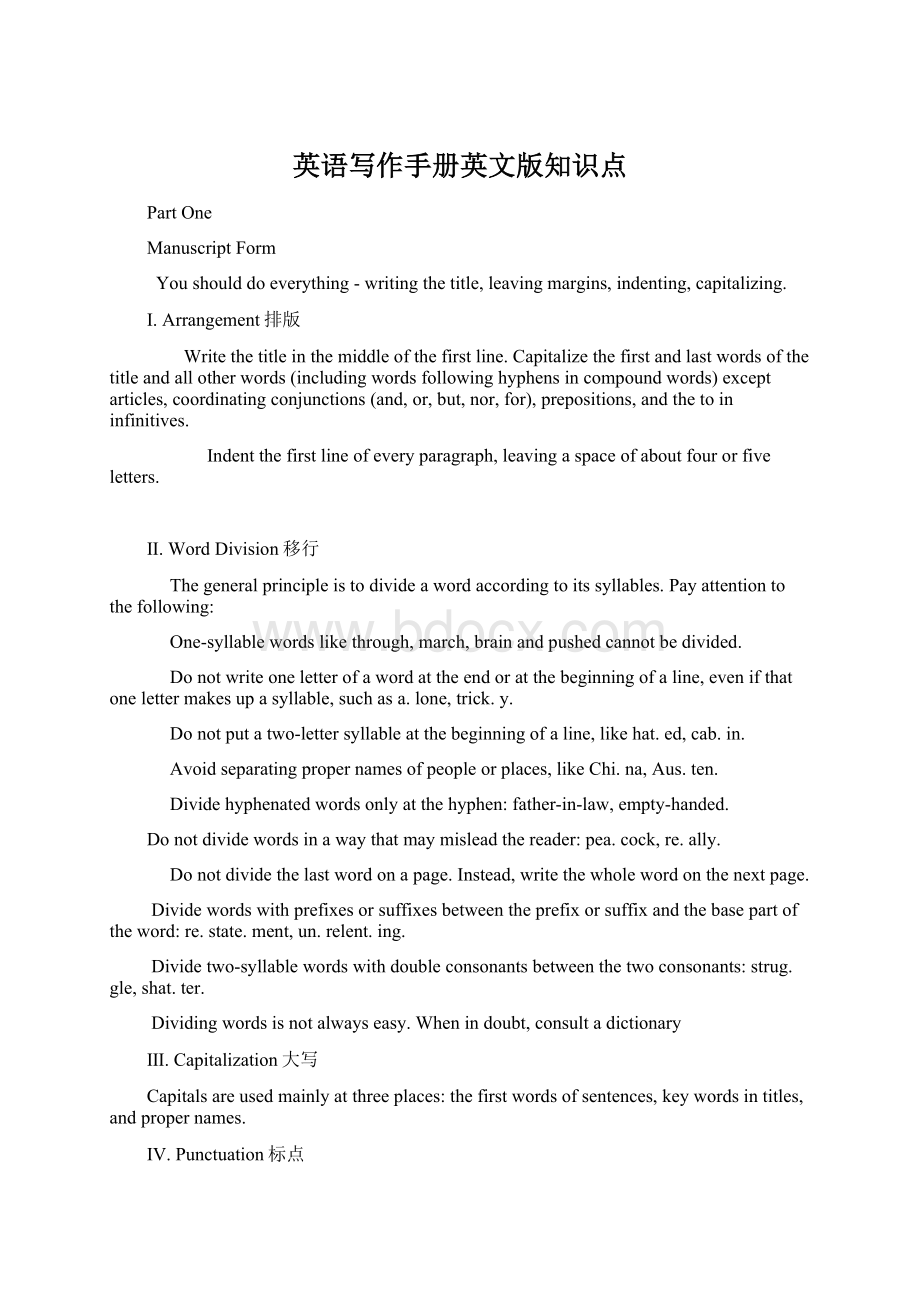英语写作手册英文版知识点文档格式.docx
《英语写作手册英文版知识点文档格式.docx》由会员分享,可在线阅读,更多相关《英语写作手册英文版知识点文档格式.docx(16页珍藏版)》请在冰豆网上搜索。

Writethetitleinthemiddleofthefirstline.Capitalizethefirstandlastwordsofthetitleandallotherwords(includingwordsfollowinghyphensincompoundwords)exceptarticles,coordinatingconjunctions(and,or,but,nor,for),prepositions,andthetoininfinitives.
Indentthefirstlineofeveryparagraph,leavingaspaceofaboutfourorfiveletters.
Ⅱ.WordDivision移行
Thegeneralprincipleistodivideawordaccordingtoitssyllables.Payattentiontothefollowing:
One-syllablewordslikethrough,march,brainandpushedcannotbedivided.
Donotwriteoneletterofawordattheendoratthebeginningofaline,evenifthatonelettermakesupasyllable,suchasa.lone,trick.y.
Donotputatwo-lettersyllableatthebeginningofaline,likehat.ed,cab.in.
Avoidseparatingpropernamesofpeopleorplaces,likeChi.na,Aus.ten.
Dividehyphenatedwordsonlyatthehyphen:
father-in-law,empty-handed.
Donotdividewordsinawaythatmaymisleadthereader:
pea.cock,re.ally.
Donotdividethelastwordonapage.Instead,writethewholewordonthenextpage.
Dividewordswithprefixesorsuffixesbetweentheprefixorsuffixandthebasepartoftheword:
re.state.ment,un.relent.ing.
Dividetwo-syllablewordswithdoubleconsonantsbetweenthetwoconsonants:
strug.gle,shat.ter.
Dividingwordsisnotalwayseasy.Whenindoubt,consultadictionary
Ⅲ.Capitalization大写
Capitalsareusedmainlyatthreeplaces:
thefirstwordsofsentences,keywordsintitles,andpropernames.
Ⅳ.Punctuation标点
V.Handwriting书法
Writecarefullysothatyourhandwritingcanbereadeasily.
PartTwo
Diction措词
Ⅰ.LevelsofWords词的类型
Thewordsthatareoftenusedmaybedivided,fromastylisticpointofview,intothreetypes:
formal,common,andinformal.
Formalwordsmayalsobecalledlearnedwords,orliterarywords,or"
big"
words.Theymainlyappearinformalwriting,mostofthemareseldomusedindailyconversation,exceptforspecialpurposes.
thosethatpeopleuseeveryday,andappearinallkindsofwriting.,theyarecalledcommonwords.
Therearewordswhicharemainlyusedininformalorfamiliarconversation.Theyseldomappearinformalwriting,andinliteraryworkstheirmainuseistorecordpeople'
sthoughtsanddialogues.TheyareusuallyshortwordsofoneortwosyllablesandmostofthemareofSaxonoriginWemaycalltheminformalwords
Slangwordsarehighlyinformal;
theymaybevividandinteresting,buttheymay,whenusedinappropriately,makethewriterorspeakersoundoffensiveorfunny
Ⅱ.TheMeaningofWords词义
Themeaningofawordhastwoaspects:
denotativeandconnotative.Aword'
sdenotationiswhatitliterallymeans,asdefinedbythedictionary;
itsconnotationisthefeelingorideasuggestedbyit.
Ⅲ.GeneralandSpecificWords泛指词和特指词
Specificwordshelptomakewritingclear,exact,vivid,andstriking,fortheyaremoreinformativeandexpressivethangeneralwords.
Ⅳ.Idioms习语
Anidiomisafixedgroupofwordswithaspecialmeaningwhichisdifferentfromthemeaningsofthewordsthatformit.
Idiomsarefrequentlyusedinspeechandwriting.Theyhelptomakeone'
slanguagesoundnaturalandidiomatic.
Ⅴ.FiguresofSpeech修辞
Wordsusedintheiroriginalmeaningsareusedliterally,whilewordsusedinextendedmeaningsforthepurposeofmakingcomparisonsorcallinguppicturesinthereader'
sorlistener'
smindareusedfiguratively.
1.Simile明喻Itisacomparisonbetweentwodistinctlydifferentthingsandthecomparisonisindicatedbythewordasorlike.
2.Metaphor暗喻Itistheuseofawordwhichoriginallydenotesonethingtorefertoanotherwithasimilarquality.
3.Personification拟人Itistotreatathingoranideaasifitwerehumanorhadhumanqualities.Inpoetrypersonificationisverycommon:
Inprosepersonificationisalsoused,thoughnotsooftenasinpoetry.
4.Metonymy转喻Itissubstitutingthenameofonethingforthatofanotherwithwhichitiscloselyassociated.
5.Synecdoche提喻Whenapartissubstitutedforthewholeorthewholeissubstitutedforapart,synecdocheisapplied
6.Euphemism委婉语Itisthesubstitutionofamildorvagueexpressionforaharshorunpleasantone.
7.Irony反语Itistheuseofwordswhichareclearlyoppositetowhatismeant,inordertoachieveaspecialeffect.
8.Overstatementandunderstatement夸大和缩小Inoverstatementthedictionexaggeratesthesubject,andinunderstatementthewordsplaydownthemagnitudeorvalueofthesubject.Overstatementisalsocalledhyperbole.
Bothaimatthesameeffect:
tomakethestatementordescriptionimpressiveorinteresting.
9.TransferredEpithet移位修饰An